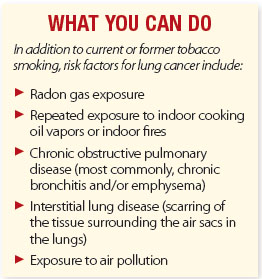Better Therapies Offer a More Positive Prognosis for Lung Cancer Patients
Lung cancer is the second-most common type of cancer and the top cause of cancerrelated deaths in the U.S., according to the National Cancer Institute (NCI). However, recent advances in lung cancer detection and treatment mean that patients with lung cancer have better survival odds.
“It is an exciting time for advances in lung cancer screening and treatment. A few years ago, the Centers for Medicare & Medicaid Services approved annual screening for lung cancer with low-dose computed tomography (LDCT) as a preventive service. As a result, more patients are being screened,” explains Brendon Stiles, MD, associate professor of cardiothoracic surgery at NewYork- Presbyterian/Weill Cornell Medicine. “Even for patients who present with advanced disease, it is a time of hope. A number of new drugs have been shown to improve survival for patients with metastatic (stage IV) disease.”
Early Detection Is Life-Saving
The most effective screening test for lung cancer is a low-dose computed tomography scan (LDCT) of the chest, according to Dr. Stiles. The National Lung Screening Trial found that, among patients who had LDCT scans, there was a higher detection rate of certain types of cancer than among patients who had chest x-rays.
“Patients ages 55 to 74 with at least 30 pack-years of tobacco smoking history (one pack-year = smoking one pack per day) who have had counseling on the potential benefits and harms of screening should have a yearly LDCT,” says Dr. Stiles.
For best results, Dr. Stiles advises that patients undergo screening at accredited Lung Cancer Screening Centers with standardized reporting and follow-up protocols. To find a screening center near you, check the Go2 Foundation for Lung Cancer’s website at https://bit.ly/3antzay or call the helpline at (800) 298-2436.
It’s important to be screened if you are at risk, since symptoms of lung cancer rarely appear before the disease is in an advanced stage.
“For lung cancer detected at its earliest stage, we expect over 80 percent of patients to be cured,” says Dr. Stiles.

Type Determines Treatment
There are two basic types of lung cancer: small cell and non-small cell lung cancer (NSCLC). Among NSCLC, adenocarcinoma and squamous cell carcinoma are the two most common types.
Treatments vary according to the type and stage of cancer.
“If NSCLC is detected early, surgery is the most effective treatment. Radiation is also sometimes used if the cancer recurs. Alternatively, metastatic NSCLC tumors are treated with chemotherapy,” says Dr. Stiles.
Adenocarcinoma and squamous cell carcinoma may also be treated with immunotherapy, which strengthens the immune system’s ability to destroy cancer cells.
Small cell lung cancer is typically treated with chemotherapy and radiation.
Targeted Drug Therapy
While standard cancer treatment methods of radiation and chemotherapy are used for some types of lung cancer, recent advances have made it possible for doctors to match, or “target,” specific medications to certain variables, such as genetic differences, that can now be detected.
Targeted drugs may block new blood vessel growth around the tumor, interrupt a signal that tells cancer cells to grow, or stop the production of proteins that causes cancer cells to spread.
“Targeted drug therapy, also called precision medicine, is the delivery of drugs based upon specific biomarkers found in a patient’s tumor,” explains Dr. Stiles. “For each of these ‘targets,’ there are specific drugs that have been demonstrated to work particularly well.”
And although there have been significant advancements in lung cancer treatment, the development of more options is continuing.
“Currently, targeted therapy has only been shown to be successful in patients with metastatic disease, but several trials are underway to see if these drugs can also help improve survival in earlier stages. Also, most targets based upon genetic mutations have been identified in patients with adenocarcinoma, but researchers are working to identify and develop specific drugs for targets in squamous cell and small cell lung cancers,” says Dr. Stiles.
With recent treatment advances plus covered annual screenings for people with an increased risk of lung cancer, the prognosis for people with lung cancer has never been more promising.
The post Better Therapies Offer a More Positive Prognosis for Lung Cancer Patients appeared first on University Health News.
Read Original Article: Better Therapies Offer a More Positive Prognosis for Lung Cancer Patients »

